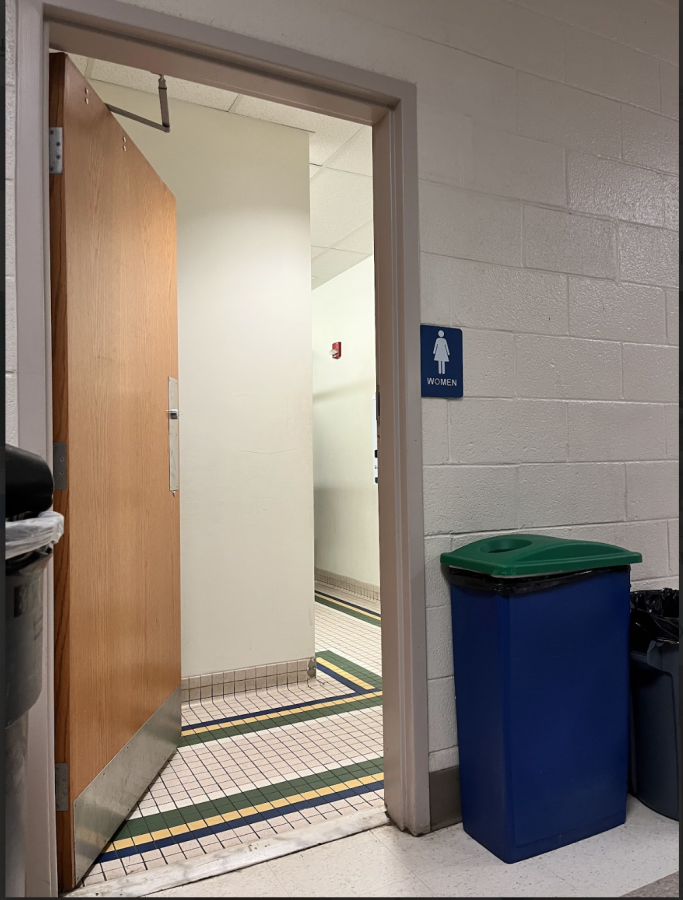MCPS attempts to smoke out potential vape users
MCPS wants to apply new security protocols to fight the growing drug problem in schools. WCHS restrooms are currently unmonitored. However, with five schools being randomly selected, WCHS may soon see vape detectors installed in the bathroom entrances.
May 15, 2023
When walking into the bathroom, the familiar saccharine scent is overwhelming. In the distance the sound of coughing and giggles fill the air. This is the reality for high schoolers in MCPS. New drugs are constantly coming onto the market and substance abuse among teens has grown exponentially in the past year. MCPS has seen drug overdoses in the youth increase by 77 percent according to the Washington Post. Now, the county has decided to crack down on drug use in schools by installing vape detectors along with other safety protocols.
MCPS is selecting five schools to implement these new measures. The new protocols include not only the detectors but also student ID badges and increased video surveillance. The chosen schools have not yet been released but currently it is the school’s security that is expected to monitor smoking on campus.
“I think [the vaping problem] is currently being effectively handled,” WCHS security guard Ray Blankenship said. “We all try to deal with it every day, but it’s a two way street because everyone has to have accountability and follow through after saying they won’t be vaping. Anything we can do to get support to make sure teenagers are making the right choices is a good thing. But it’s a team effort and will only work if everyone does their part.”
Currently, the security department handles any issues that arise with drugs on school property. Now, with the new detectors, it will be nearly impossible for students to smoke in areas that are not monitored on camera. According to Rosedalekb Vape, vape detectors can identify chemical particles as small as 0.3 microns in size. Specifically, they can pinpoint nicotine, THC oil, VOCs, flavorings, heavy metals and more. These detectors have never been used in MCPS schools before, so what their exact results will be are unclear.
“I don’t think these vape detectors are necessarily going to give anyone a reason to find other places [to smoke on school property besides the bathrooms],” Blankenship said. “To be fair, the only locations not on camera in school are the bathrooms and the classrooms. It’s not like kids are going to be vaping in their classrooms.”
Not only is MCPS installing new safety measures, but they are also persisting with their “Student Restroom Monitoring Plan” which consists of increasing bathroom checks, installing latches on exterior doors and limiting access to designated restrooms. Although security feels fairly confident about the results of the new detectors, not all students feel the same. Many students think it is unreasonable for staff to have high expectations regarding the detectors.
“I don’t think that expecting these measures to stop drug use in schools is realistic,” WCHS junior Daniela Ruiz said. “It’s very hard for the school to control what is happening in the bathrooms since they have to respect students’ privacy, and putting a vape detector is not going to fully stop everyone. In my opinion, the vape detectors will not be much help with issues because people will find ways to do it without getting caught, or will begin to use different devices or drugs which could be worse for them.”
Some students have shared concerns that by implementing these measures, their peers may turn to other, more dangerous alternatives during school hours. Although vaping has been viewed by many as a relatively harmless substance, as time passes health specialists are learning more about the devices.
“As a parent, these safety measures would make me feel more comfortable [with the influences my children are exposed to],” WCHS teacher Stacey Fisher said. “There is harm in second hand smoke for vaping. There’s chemicals in those devices that are cancer causing which is really scary. People are discovering more as they are becoming more popular. Lung cancer usually develops after years of smoking normal cigarettes, but in some cases when vaping people are developing lung cancer in under a year.”
WCHS teachers and parents feel troubled about students being consistently exposed to the dangerous chemicals in vapes. According to the Center for Disease Control and Prevention, nicotine hurts the developing adolescent brain as it harms the parts of the brain that control learning, impulse control, attention and mood. Furthermore, vaping has been linked to mental health symptoms such as anxiety and depression. Some individuals have communicated that they feel as though what would help students most is to provide them with resources to understand and put a stop to their addiction.
“Schools should focus more on helping students stop vaping,” Ruiz said. “It is important for students to understand why the school is trying to prevent this issue from continuing and for them to realize that they are putting themselves in danger. Schools aren’t going to be able to fully stop drug usage in the bathrooms if they don’t provide helpful resources for students to use. I also feel as though providing resources will make students feel more safe and like they can rely on the school, while with just using the vape detectors they are going to continue using drugs but in more dangerous ways in order to not get caught”
Ruiz is fearful that the vape detectors may have more negative results than positive if they are not accompanied by additional support systems. Yet, it is important to remember that the detectors are there to act as a way for the county to communicate they are not tolerating smoking on school grounds. Even if MCPS is not providing direct addiction support staff for addiction, the increased emphasis on mental health this school year is always there for students to rely on.
“We have a wonderful Wellness Center that is being set up here at school with three different adults that are trained in helping kids with these issues,” Blankenship said. “And also security too, I always tell every kid this and I mean this was not supposed to be here to get you in trouble, we’re trying to make sure you are all the best versions of yourselves you can be and even if we start getting more calls to the bathroom [with the possible installation of the detectors], as long as you are learning from your mistakes that’s what matters.”



